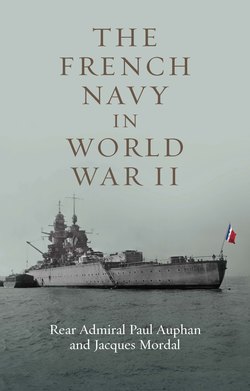Читать книгу The French Navy in World War II - Paul Auphan - Страница 5
ОглавлениеSeldom in the history of a great nation has the fate of a Navy been so tragically involved in political events as in France during the course of the Second World War.
Heir to a past which dates back to the Crusades, the French Navy had previously experienced many painful vicissitudes. Not one was to equal that of 1939-1945.
After having efficiently contributed to the rescue of the French Army at Dunkirk and removed from reach of the enemy everything that floated in the Atlantic harbors, the Navy, like all Frenchmen, had its heart crushed by the tragedy of defeat. The causes of it were complex. The only chance to recover was to remain united. Faithful to its traditions, the Navy remained in the ways of discipline consistent with the promise it had given the Allies. While waiting for the day when the United States of America could come to the assistance of Europe, it maintained the empire welded to the mother country, revictualled the unhappy French and safeguarded—often under very difficult conditions—the French heritage overseas. That long martyrdom led to the scuttling of the French Fleet at Toulon on the 27th of November, 1942. On thus scuttling half of its Fleet, the Navy amputated one of its limbs, but saved its soul. No matter the separate ways they had pursued under the shock of events, all of its seamen could now, in a spirit of unanimity, return to the fight. They participated in the final victory to the best of their abilities. It is not their fault if their heroic actions did not end in unity.
Such is the story, not well known, even in France, and often misunderstood, that Admiral Auphan and Jacques Mordal narrate in this book. Few men could tell the story so well because each of them, after having actively participated in the war at sea, continued under the German occupation to oppose themselves to the Germanization of our country.
I do not forget the services rendered by Admiral Auphan, Deputy Chief of Staff of the French Admiralty, when he proceeded to Dover, somewhat at my request, to organize the revictualling and later the evacuation of the French divisions at Dunkirk, or each time an occasion presented itself to the Navy, during the Battle of France, to come to the aid of the Army. Neither do I forget the assistance he gave me after the armistice, when I did my utmost to reconstitute, in secrecy, the Army of Africa. Before being arrested by the Gestapo, in November, 1942, I was a witness to his efforts, as Minister of the Navy, to save the Fleet. Nobody is more qualified to express the state of mind of the Navy during the entire tragedy than Admiral Auphan himself.
His collaborator, Jacques Mordal, was blown up on a mine at the time of the evacuation of Dunkirk and was seriously wounded. He has been mentioned several times in dispatches, once for work in the Resistance. He has now dedicated himself to the study of history, in particular that of the Second World War. His books speak with authority. Their objectivity and their accuracy have never been questioned either in France or abroad.
I must compliment the United States Naval Institute for publishing a work indispensable to whoever wishes to understand, without a preconceived idea or made-up mind, the history of the six years which shook the world. But I know the two authors well enough to be certain that in stating merely the truth, they have aimed at a better thing yet—to strengthen the traditional bonds of friendship which unite us with the United States of America and to promote an understanding between the two shores of the Atlantic, the better to defend civilization.
MAXIME WEYGAND
General, French Army
Member of the French Academy
Paris
November 10, 1957
